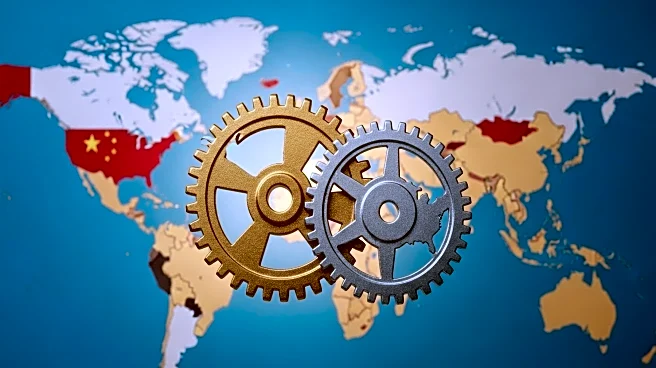What's Happening?
Beijing has issued a warning to Washington, stating that it will implement countermeasures if President Trump proceeds with his threat to impose 100% tariffs on Chinese imports. This threat follows China's recent restrictions on the export of rare earth minerals, escalating tensions between the two nations. A spokesperson from China's Ministry of Commerce emphasized that resorting to high tariffs is not the appropriate way to engage with China and warned that if the US continues to act unilaterally, China will take measures to protect its interests. The situation has caused concern among investors and industries, fearing a repeat of previous tariff battles that significantly impacted trade between the two countries.
Why It's Important?
The escalating trade tensions between the US and China, the world's two largest economies, have significant implications for global markets and industries. The potential imposition of 100% tariffs by the US could disrupt supply chains, particularly in sectors reliant on rare earth minerals, such as technology and automotive industries. The uncertainty surrounding trade negotiations could lead to increased volatility in stock markets and affect economic growth. Both countries have substantial stakes in maintaining stable trade relations, and the ongoing dispute could have far-reaching consequences for international trade policies and economic stability.
What's Next?
The situation remains fluid, with President Trump and Chinese leader Xi Jinping expected to meet in South Korea in two weeks, although the meeting's occurrence is now uncertain due to the rare earths issue. Both nations may continue to negotiate to avoid further escalation, but if the US proceeds with the tariffs, China is likely to implement its countermeasures, potentially leading to a prolonged trade conflict. Stakeholders, including businesses and policymakers, will be closely monitoring developments to assess the impact on trade and economic relations.
Beyond the Headlines
The trade dispute highlights broader issues of national security and economic sovereignty, as both countries seek to protect their strategic interests. The use of tariffs and export controls as tools in international diplomacy raises ethical and legal questions about the balance between free trade and national security. The situation may prompt other countries to reassess their trade policies and alliances, potentially leading to shifts in global economic power dynamics.










